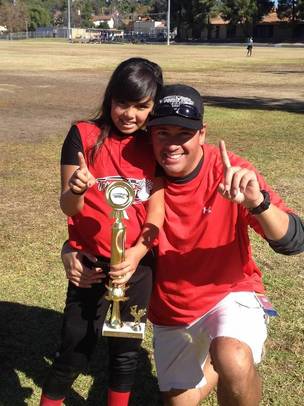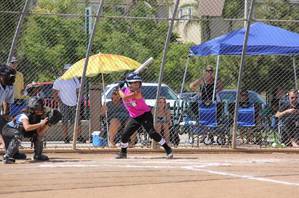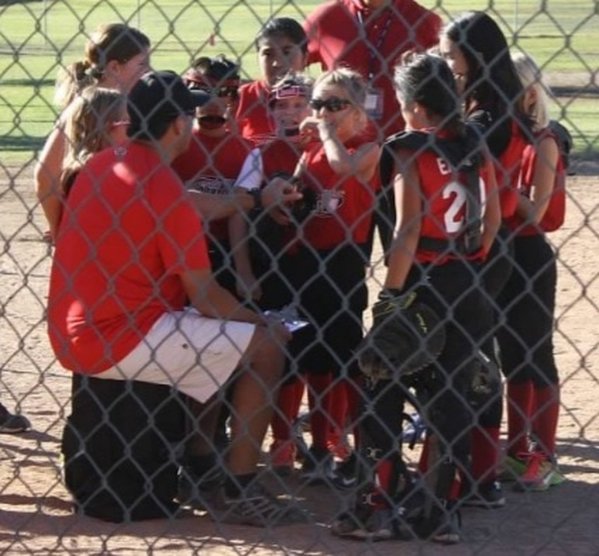Moni Ritchie Hadley
|
What makes a good coach? Passion - I grew up loving this game and am fortunate that I have been able to stay close to the game all my life. Knowing that I am able to help others improve their skill is incredibly rewarding for me. I love seeing the look on a player's face when they have those a-ha moments! Sharing the success after seeing the hard work and practice put in by the player is priceless! Patience - I have the patience to work with players while they develop their skill. I have realistic expectations about player development and celebrate smaller improvements in their improvement. Patience is important because girls need to understand that it is acceptable to make mistakes. Expectations - Although I want each player to play to their own potential, I also have realistic expectations about what they are capable of. May coaches will coach a team beyond their capability and expect the players to perform advanced plays during the game. Coaching - I have found that rather than telling a player what they need to do to be more effective, drilling a player and demonstrating what needs to happen for an improved outcome is much more effective. Catching a pop fly is the best example I can provide for this approach. I can tell a player to get under a ball and catch it in front of their face. On the other hand, it is more effective to show a player the proper position through a drill. In the drill I use soft/squishy stress balls. At very close range I toss a ball in the air about 7 feet high. I tell the player to catch the ball with their forehead. In doing so, the player does not get hurt (safety first!) and finds their body and head in the proper position to catch a fly ball. After a several tosses, I take a few steps back and toss the ball higher, allowing the player more time to get under the ball. After a few reps of this drill, we do higher and farther pop flies with a tennis ball while incorporating proper use of the glove. How is coaching girls different from coaching boys? Girls are much more shy. Boys are usually eager to play and not afraid to go for it. Girls can be a bit timid and unsure of what to do at times. On game day, it is important to make the girls feel good and happy. If I can accomplish this, they tend to play better. In our pre-game warm ups, we always play music and try to keep things light so that the girls are loose and ready to play. Why is it important for girls to play sports? Sports not only address the obvious, teamwork and social skills, there are also so many life lessons paralleled in each season. Learning these lessons at a younger age helps prepare the young athletes for larger decisions in the future. In our post season meeting when we give out awards, I often share the life lesson we experienced and highlight how we were able to manage through it. Sports also gives a player confidence. When they are properly coached, prepared, and able to succeed their level of confidence soars. How does playing sports empower young girls? Softball, as with other sports, often requires faster decision making. In many instances, players are required to make split decisions during the game. Through positive reinforcement about the decision made, girls are empowered to think fast, make a decision, and react. What role does discipline play in softball? Discipline plays an important role in many aspects of the game. Softball is a game of failures so it is important that players remain as disciplined as possible to yield the best results. We often talk about controlling what we can control in the game. A player about to hit is a good example of how important it is to have discipline. Although we cannot control how fast the pitcher pitches, the spin she puts on the ball, or whether she pitches a strike or a ball - the batter has 100% control over whether she swings at a ball (non-strike) or a strike. Swinging at a ball (non-strike) only helps the pitcher. Instead, we want the batter to be disciplined enough to only swing at strikes as much as possible. How do you handle overly competitive parents? Managing these parents usually starts with the team meeting. In this meeting I set the expectation with players and parents. Although my expectation on the parent is to have them encourage, cheer, and support the players, I have seen some parents, harshly, yell what they think the player is doing wrong. Parents in this league, for the most part, aren't over the top. If the parent behavior is bad enough, I will speak with them after the game or during practice to remind them how much better their player will play with proper encouragement. Usually this is enough of a intervention and reality check for the parent. How do girls handle the competition? As a recreation league, we have players of all levels on each team. Generally speaking the newer players enjoy playing the game (win or lose) and socializing with their peers. In the younger divisions, many players just want to have fun. There are always those players much more serious about the game and want a higher level of competition. These players usually play at a higher level and are more proficient in the positions they play. It is very common for players in the league to take additional lessons in pitching, hitting, and/or with a catcher coach. When two competitive teams square off in a game, it is incredibly fun to watch and manage! How do you handle the kid on the team that does not want to be there? For the most part, players want to be on a team. Because we are a recreation league, nobody is required to play. If anything, some players are less interested. As an example, I was coaching a 7 year old player. When she was up to bat, she rarely watched the ball. During warm ups (prior to our next game), I asked her what she was thinking about when she tried to hit the ball. She replied, "Coach, I'm thinking about butterflies and selfies"! After sharing a good laugh I asked her how much bigger her smile will be after taking a selfie after hitting the ball. We don't always get the serious players but we have a fun time and hopefully make it a good enough experience for them to want to come back for more. Each player wants something out of the season - I try to identify it early and find a way to give it to them. Describe a bad practice vs. a good practice. To me a bad practice is one that doesn't engage the majority of the team. The worst practice I can think of is when the coach is pitching a ball to one batter and the rest of the team is in a defensive position waiting for the player to hit the ball to them. This approach takes too much time and focuses only on 1 player at a time. As a result, many players play in the dirt or with the grass and are not engaged with the practice. A good practice begins with preparation and keep the girls moving. Because practices are only one hour, I usually have players work on 3 drills in 3 different parts of the field. Once a player is done with one station, they go to the next. Certainly there are times when we need more practices involving team work and everyone working together. You know practice is a good one when parents collectively cheer throughout the practice after players successfully complete the drills. What are the pros and cons of coaching your daugher? Pros: a) More 1 on 1 time to develop her skill in areas she needs practice. b) I know her strengths and areas in need of improvement. We can continue keeping her strengths strong and improving in other areas. c) I know how she thinks and how to coach her. With the wrong approach I know she will shut down. With the right approach she will run through a wall for you. Cons: As her primary coach for several seasons, the lines between dad and coach tend to get muddy, at times. My daughter is a pleaser and I know that another coach will get more out of her. As her head coach for several seasons, there are times that she just sees me as Dad telling her what to do. What do you tell the girls after a loss vs. a win? I coach to the expectation - that we all play to our potential. I often say that the outcome of the game is determined by the team who collectively does the "4 goods" the best. The 4 goods are: good hitting, good pitching, good catching/fielding, and good throwing. The team that collectively does this the best usually gets the win. My message usually evolves throughout the season. In the first part of the season, we are all making adjustments (players and coaches) and learning the other teams. We identify what we did well and what we need to practice. As we progress through the season we start to evaluate how well we are progressing as a team toward playing to our potential. This coupled with a self evaluation of our performance vs the 4 goods usually helps us identify what we need to work on and what we could have done better during the game After a win we take a similar approach to what we review after a loss. We evaluate our performance vs the 4 goods and celebrate the win. I also remind the team that just because we won that game, it doesn't mean that the other team can't come back to beat us the next time. If we continue to work hard and improve, our chances of success in the future increases. What do you tell the girls every day? 100% Effort - I always ask my players to try their hardest at anything they do. If they give 100% effort, nobody can ask for anything more. This approach is effective for a team full of varying skill. I never expect a developing player to have the skill of an all star. Instead, I ask that all players play to their best capability. I always tell my team, "We practice like we play (in a game) and we play (in a game) like we practice!" This establishes the same expectation whether practicing or playing in a game. The players that can meet this expectation are much more equipped to make plays in a game because they are mentally and physically ready to react... because of of the amount of practice and preparation they have put in prior to game day What is the key to coaching girls? At the end of the day, the key to coaching girls is to make it fun. Whether it's giving award stickers for performance during a game or giving candy during practice for successfully completing a difficulty drill, girls like to smile and have fun. If I can make this happen during practices and games, the end result for the player is usually a positive one. Learn more about James Ritchie.
0 Comments
Leave a Reply. |



 RSS Feed
RSS Feed
